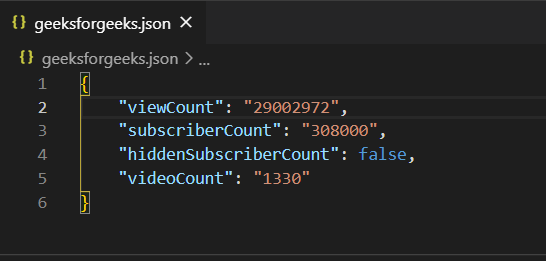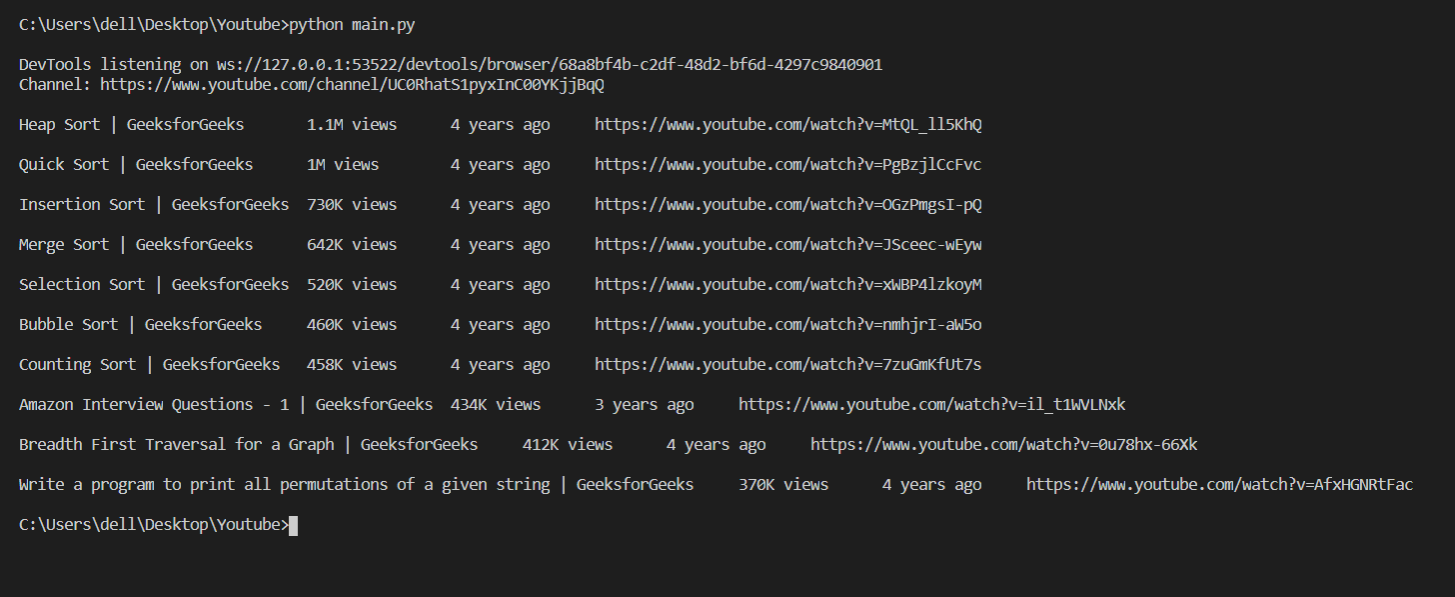How to extract youtube data in Python?
Last Updated :
17 Feb, 2023
Prerequisites: Beautifulsoup
YouTube statistics of a YouTube channel can be used for analysis and it can also be extracted using python code. A lot of data like viewCount, subscriberCount, and videoCount can be retrieved. This article discusses 2 ways in which this can be done.
Method 1: Using YouTube API
First we need to generate an API key. You need a Google Account to access the Google API Console, request an API key, and register your application. You can use Google APIs page to do so.
To extract data we need the channel id of the YouTube channel whose stats we want to view. To get the channel id visit that particular YouTube channel and copy the last part of the URL (In the examples given below channel id of GeeksForGeeks channel are used).
Approach
- First create youtube_statistics.py
- In this file extract data using YTstats class and generate a json file will all the data extracted.
- Now create main.py
- In main import youtube_statistics.py
- Add API key and channel id
- Now using the first file data corresponding to the key given will be retrieved and saved to json file.
Example :
Code for main.py file :
Python3
from youtube_statistics import YTstats
API_KEY = "AIzaSyA-0KfpLK04NpQN1XghxhSlzG-WkC3DHLs"
channel_id = "UC0RhatS1pyxInC00YKjjBqQ"
yt = YTstats(API_KEY, channel_id)
yt.get_channel_statistics()
yt.dump()
|
Code for youtube_statistics.py file :
Python3
import requests
import json
class YTstats:
def __init__(self, api_key, channel_id):
self.api_key = api_key
self.channel_id = channel_id
self.channel_statistics = None
def get_channel_statistics(self):
json_url = requests.get(url)
data = json.loads(json_url.text)
try:
data = data["items"][0]["statistics"]
except:
data = None
self.channel_statistics = data
return data
def dump(self):
if self.channel_statistics is None:
return
channel_title = "GeeksForGeeks"
channel_title = channel_title.replace(" ", "_").lower()
file_name = channel_title + '.json'
with open(file_name, 'w') as f:
json.dump(self.channel_statistics, f, indent=4)
print('file dumped')
|
Output:

Method 2: Using BeautifulSoup
Beautiful Soup is a Python library for pulling data out of HTML and XML files. In this approach we will use BeautifulSoup and Selenium to scrape data from YouTube channels. This program will tell the views, time since posted, title and urls of the videos and print them using Python’s formatting.
Approach
- Import module
- Provide url of the channel whose data is to be fetched
- Extract data
- Display data fetched.
Example:
Python3
from selenium import webdriver
from bs4 import BeautifulSoup
urls = [
]
def main():
driver = webdriver.Chrome()
for url in urls:
driver.get('{}/videos?view=0&sort=p&flow=grid'.format(url))
content = driver.page_source.encode('utf-8').strip()
soup = BeautifulSoup(content, 'lxml')
titles = soup.findAll('a', id='video-title')
views = soup.findAll(
'span', class_='style-scope ytd-grid-video-renderer')
video_urls = soup.findAll('a', id='video-title')
print('Channel: {}'.format(url))
i = 0
j = 0
for title in titles[:10]:
views[i].text, views[i+1].text, video_urls[j].get('href')))
i += 2
j += 1
main()
|
Output

Share your thoughts in the comments
Please Login to comment...